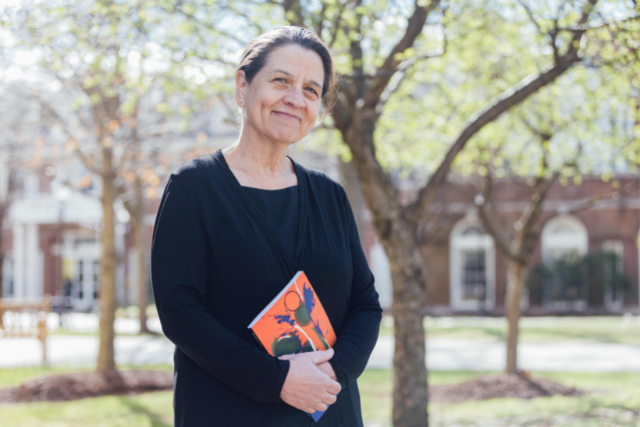
The world has been captured by the enduring language of William Shakespeare, but according to a new book from a TCNJ English professor, no one can seem to give him the last word.
Even after 400 years since his death (406 this month, to be exact) our culture has maintained a dialogue with William Shakespeare. His works, widely studied and interpreted, provide a continuing cultural framework. His themes of love, friendship, fear, and conflict are timeless and have taken on added relevance for many as we live through a pandemic in similar fashion as how Shakespeare lived through periodic waves of the plague.
In her new book, Women Talk Back to Shakespeare, Contemporary Adaptations and Appropriations, TCNJ English Professor Jo Eldridge Carney explored seven adaptations of Shakespeare’s work published during the last decade in which women authors or characters talk back to the writings of The Bard. Those works include the 2014 novel Station Eleven by Emily St. John Mandel and Maggie O’Farrell’s 2020 novel Hamnet, which centers on the death of Shakespeare’s only son (presumably from the plague). Station Eleven, which premiered this winter as an HBO mini-series, opens with a scene from Shakespeare’s King Lear and follows a traveling symphony that performs The Bard’s works to encampments of survivors 20 years after a flu pandemic that caused the collapse of civilization.
Carney’s book examines the current cultural relevance of Shakespeare’s works. It includes an examination of Desdemona, a libretto by Toni Morrison and Rokia Traoré in which the wife of the title character in Shakespeare’s Othello opens a dialogue about race and class. Margaret Atwood’s novel Hag-Seed, which plays off Shakespeare’s The Tempest, deals with prison reform.
“Shakespeare occupies a very large and dominant place in not just our literary culture but our larger culture,” she said. “His impact has not diminished, largely thanks to legions of adaptations.”
Talking back doesn’t connote disrespect, noted Carney; it can be a critique but is more broadly an engagement.
“There are so many connections that bring us back and forward” to the issues of our time,” said Carney, who wrote most of the book during the COVID-19 pandemic.
Most of Shakespeare’s life (1564–1616) and work was informed by a pandemic. He was born shortly before an outbreak of bubonic plague and there were flare-ups throughout his life. The deadly episodes often closed the playhouses where he plied his craft, forcing theater companies to travel. And the plague figured prominently in the stories he crafted. Many may remember that Juliet’s courier – carrying a message that might have averted tragedy – was forced into quarantine before he could deliver the news to love-sick Romeo.
At TCNJ, Carney teaches courses in Shakespeare and other topics involving adaptations. She previously authored a book on the depiction of queens in fairy tales. Her research for the latest book gave her ideas for another, she said.
“People are constantly engaging with Shakespeare … I keep seeing connections.”
— Patricia Alex
